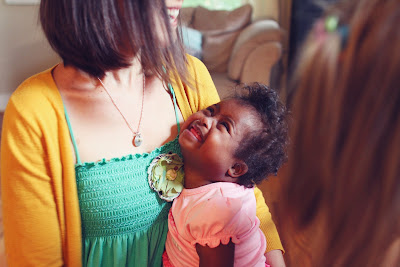Something I'm regularly asked as an adoptive parent is,
"How did you decide to adopt?"
Some people are just curious, and others can't fathom why a couple with three biological children would choose to raise and love a child (or four) not born to them.
The fact is of course that most of us have mulitple reasons for embarking on such a journey--and it's not as simple as an in-the-middle-of-the-produce-aisle-of-the-grocery-store answer might afford. Especially when your two-year-old is attempting to sneakily put assorted bags of candy into your cart while pulling your four-year-old's hair.
Ultimately, making the decision to adopt is a multi-step discernment process, and one that usually involves a lot of back-and-forth and thinking through scenarios and ruling out others. So I thought I'd share a little bit here about how the process played out for us, and maybe this way I can just refer people to my blog when my kids start going crazy in the store. :)
1.) It's not either/or. When my husband and I first decided to adopt several years ago, we were not doing so in lieu of having another eventual biological child. We remained open to life throughout the process, and I did in fact get pregnant four short months after my sons came home. And there was much rejoicing. (Have you met Kaitlyn?) So yes, you can be open to more future biological children and also pursue an adoption, and you don't have to have your entire family planned out to begin the paperwork.
2.) It doesn't have to be a lifelong dream. People often wonder if we always knew we wanted to adopt. And the answer is no, we did not. In fact, I'd never remotely considered adoption until I was standing in the shower one day. (I do some of my best thinking in the shower. Don't judge.) And the idea of international adoption literally popped into my head. I know it was a God thing, because there was no logical reason for it. And so after my shower I got dressed and made a beeline for the the computer, where I began reasearching the global orphan crisis. And I was appalled by the vast number of adoptable orphans in need of a family. I thought about my little girl napping down the hall and how she got to go to sleep with a full tummy and a mommy and daddy who loved her, while many children didn't. I looked at profiles of waiting children with medical needs and knew that at 23 years old I was wrecked--in a really good way.
3.) It doesn't have to be his/her idea too. Eventually you and your spouse will need to be on the same page about adoption for it to work. But initially, most likely, it will be just one of you who comes up with the seemingly wild idea. And that's okay. I am a firm believer in the idea that God works in marriages through our personal, sometimes initially-individual convictions. He won't necessarily give both of you the same passion and desire at first. If you feel a call to adopt, and he/she doesn't, you can respectfully share your heart and thoughts and see what happens. But do your research first. Have some figures in mind when, inevitably, they ask how much it costs. Get a handle on the general process. Most of all be loving and patient, because this is most likely all brand-new for them. I was really nervous going to Kevin with my convictions and thoughts, mostly because I felt so strongly that we should do this and what if he said no? But he didn't. He heard me out that afternoon, saw that this was something I cared deeply about, and God led him--not too long after--to the same convictions.
4.) It doesn't have to be all mapped out. International adoption means rolling with the punches. Be flexible and know that if God wants you to become the family of a child in need, it will happen, and it's okay if you enter the process unsure of how it will turn out. We began our last adoption with the intention of adopting two waiting children who'd been born with HIV. But some horrible things (that were out of our control) happened in-country, rendering that impossible, which meant we were stuck finalizing a homestudy when we had no clue who we were adopting or what we were going to do. We reached the place where we had to simply hold our hands open and tell God that we would finish up our homestudy and trust that He needed our family for children we didn't yet know about. And it turns out He did. So while it's good to have a general idea of what you're going to do, remember that things don't always go the way you imagine and, well, that's okay.
5.) It's not everyone's dream. This one was embarrassingly hard for me to learn. When you feel so strongly about something, it's really hard not to question why everyone else isn't doing it. Especially when it's a good thing to do. But the fact remains that most of your family and friends won't go on to follow in your footsteps and adopt a child. Often, people will question your sanity or even tell you that you're making a huge mistake. And the best thing you can do is simply live the story God's given you, and live it well, and be grateful that He chose you for it.
6.) It's okay to be afraid. When we were in the process of bringing our sons home several years ago, I was beyond excited the.en.ti.re.time. Really. Yes I read all the attachment books and I knew that a challenging placement might certainly be in my future, but nothing could dampen my spirits. We were adopting, and I was thrilled. This second time around though--and I'm going to be painfully honest here--I regularly struggled with doubts. And fear. How would my family change? What if things went really badly? How would my other children adjust? What were we doing? I just didn't have that strong sense of purpose and optimism that I'd had before--even though I couldn't deny that God had brought us to this point. But you know what? Things with my daughters have gone amazingly well. And even if they hadn't, fear during the process is okay and doesn't necessarily mean you shouldn't be adopting. Sometimes God will hold your hand and smooth out all the bumps, and sometimes He'll pull back a little and force you to walk by faith.
7.) It's not about who you are. While any discernment process will (and ought to) include taking a good, long look at whether or not you are suited for the task, it's important to remember that when it comes to adoption, there's really not a one-size-fits-all standard. I was only 23 (about to turn 24) when we began the paperchase to bring our boys home, and I know plenty of people who've adopted in their 40s. Adoption seems most prevalent in Evangelical Protestant circles, but I can assure you there's nothing that makes it incompatible with any particular worldview. (On a personal note, I'd love to see adoption become more common among my fellow Catholics. We talk a lot about openness to life and generous parenting, and oh my goodness, adoption is such a beautiful picture of both of those things.) Just know that no matter who you are, whether you already have five children or two, it's possible that God is calling you to adopt. Don't rule yourself out because you don't identify with this or that adoptive family that you know--good families come in all shapes and sizes.
8.) It's about redemption (and redemption isn't easy). One of the most important considerations in deciding whether to adopt is, am I open to bringing trauma and brokenness into my family and home? I don't mean to sound negative, but the truth is that while adoption is GOOD, relinquishment/abandonment/death is TRAGIC. All four of my adopted children suffered major loss before coming into my family. There are holes there that I will never be able to fill--only God can bind up those wounds and work all for the good. And in the practical day-to-day, I have personally found that even though all of my children attached well, we have faced various hurdles along the way. Small ones to be SURE, but hurdles just the same. Both of my sons have had some learning delays, one of them has ADHD, and my daughters have experienced some grief and things over the past several months. We have had difficult conversations in our home over the years about birthmothers, and my children knew words like "poverty" and "HIV" from an extremely early age. Many families experience behavioral issues related to past trauma. So, yeah, don't expect that your child will come home ever-so-grateful to be at your house and wanting to please at every turn. They have experienced more pain in their short life than you or I probably ever will, and that is going to manifest itself. It's part of your family landscape now.
9.) It's not all about the money (but it's expensive.) One of the number one reasons people give for not being able to adopt is finances. And it's true: international adoption is expensive. But. Do some research on the Federal Adoption Tax Credit. Think about whether you have a Home Equity Line of Credit (or can open one.) See how much each fee is and when it is due, because you don't pay all at once, and things always seem more manageable in small chunks. Look into grants and loans that are available for adoptive families. Think about places you can save a bit or about some sacrifices you can make. The truth is that most people who complete an adoption are NOT wealthy by US standards, and most of us did NOT have $25,000 just sitting around in the bank at the front-end of the process.
10.) It's all about meeting needs and waiting children. I saved this one for last because it's my own personal soapbox (and not always very popular). And it's ultimately the most important thing I'm going to say here. Are you ready? Here it is: if you feel the call to adopt, find out where the needs are...and go meet those needs. Even if you grew up just KNOWING that you were going to adopt a two-month-old baby girl with brown hair from Scotland, if there are dozens and dozens of names on a waiting list to do so, go someplace else where the CHILDREN are the ones waiting. Because international adoption should never be about supplying Americans with a demand for healthy babies. Ever. This can lead to in-country child-trafficking and baby-buying by unethical agencies and causes a whole host of other problems. And believe me, from a global perspective, there are many, MANY children waiting for homes. A lot of them are older. A lot of them have medical needs. And if we truly want to cultivate a heart for the orphan, we must recognize where the needs are. Be aware too that things regularly change in any given country--sometimes, by the time we're ready to adopt, we have to change course and reevaluate what we're going to do. Figure out what your non-negotiables are (age? health?) and then find a situation where children in that category are currently waiting. Maybe it's Ukraine or Ethiopia, maybe it will be domestic foster care, maybe you'll decide now is simply not the time. But try to always remember that in addition to adding to your family in a pretty amazing way, adoption is about becoming a family to a child who needs one.















